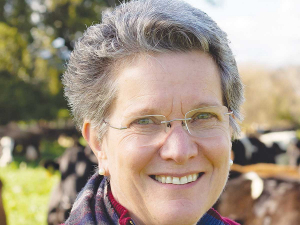Nicola Shadbolt elected as LIC director
Academic and former Fonterra director Nicola Shadbolt has been elected as LIC director.
 Nicola Shadbolt says that in the current climate, the cooperative ethos and principles resonated with consumers.
Nicola Shadbolt says that in the current climate, the cooperative ethos and principles resonated with consumers.
Agribusiness expert Professor Nicola Shadbolt says that New Zealand cooperatives have a bright future ahead of them.
Shadbolt, a professor of agribusiness and farm management at Massey University, received the Outstanding Co-operative Contribution Award at the Cooperative Business New Zealand Awards last month.
“There is scope to explore co-ops in other sectors and to continue to learn from and share how co-ops and other collective groups work best so we evolve to be stronger still,” Shadbolt told Dairy News.
She says that in the current climate, the cooperative ethos and principles resonated with consumers, but that people need to recognise that businesses were cooperatives.
“Co-ops in New Zealand need to make much more of the fact they are a cooperative, they are a collective of members.
“Collective action is critical when power imbalances exist in markets; farmers are weak sellers and weak buyers by default as our businesses are much smaller than those we transact with,” she said.
She adds that co-operatives provide farmers with an opportunity to have a more active role in the supply chain.
Shadbolt says the co-operative system is often misunderstood by some of the people who wish to change how it works.
“Remember that cooperatives are not taught in business schools of New Zealand so in the majority of cases they are an unknown construct for the accountants and business managers cooperatives employ or put on their boards.”
She says the instinct in these cases is to change the model into a corporate model, which weakens cooperatives.
Shadbolt says she wants to recognise her postgraduate students for their work in building an understanding of the cooperative business model.
“These students are the means by which the cooperative body of knowledge grows,” she said.“My hope is that the learning, and the sharing of that learning, never ends, as that is how the model will best evolve,” she said.
The 5+ A Day Charitable Trust has launched a collection of affordable recipes designed to turn everyday vegetables into seasonal stars.
Jane Mellsopp has been confirmed as the new Government Appointee to the New Zealand Meat Board (NZMB).
To celebrate the tenth anniversary of its annual Good Deeds competition, Rabobank will give away $100,000 to improve rural community hubs, schools, clubrooms, and marae across New Zealand.
Agricultural and veterinary product supplier Shoof International has appointed Michaela Dumper as its new chief executive.
Federated Farmers is celebrating following the Government's announcement that young farmers will be able to use their KiwiSaver funds to buy their first home or farm.
The Meat Industry Association of New Zealand (MIA) today announced that Chief Executive Officer Sirma Karapeeva has resigned from the role.
OPINION: Staying with politics, with less than nine months to go before the general elections, there’s confusion in the Labour…
OPINION: Winston Peters' tirade against the free trade deal stitched with India may not be all political posturing by the…